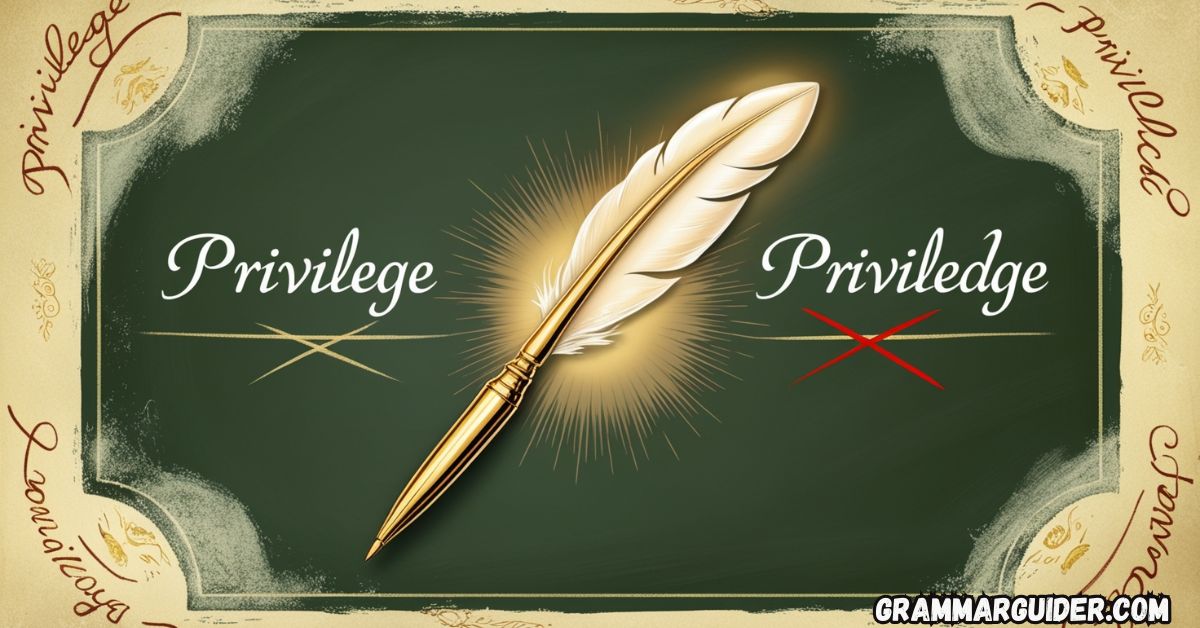In the world of writing, spelling matters. A single mistake can change the meaning of a word or leave a bad impression. Among the most commonly debated words in English is the term privilege. Many people mistakenly spell it as priviledge, but is this correct?
Let’s dive into the differences between privilege and priviledge, explore the rules, and clarify once and for all which spelling is accurate.
What Is the Correct Spelling?
The correct spelling of the word is privilege. It comes from the Latin word privilegium, which means “a law affecting one person or a group.” Over time, this word evolved into the modern form we use today. The variant priviledge is a misspelling and doesn’t appear in standard English dictionaries. So, privilege vs priviledge is a clear-cut battle privilege wins.
Let’s explore a few scenarios to illustrate these common mistakes.
The History Behind “Privilege”
Understanding the history of words can often clear up confusion, especially with English words that have evolved over time. The word privilege comes from the Latin privilegium, which meant a special law or benefit granted to an individual or group. This term has kept its form for centuries, and its meaning still reflects exclusivity or special rights.
However, over time, a common misspelling emerged: priviledge. While this variant may appear in informal writing or as a typographical error, it is not the correct form of the word.
Why Is “Privilege” the Correct Spelling?
The main reason privilege is the proper spelling is due to etymology. It follows the traditional Latin formation of words. The “i” before the “l” is a key feature that aligns with how the word evolved.
The confusion arises because English often drops letters from words over time, or changes their forms. But in this case, the “i” remains, and spelling priviledge with an extra “e” is not supported by any historical or linguistic standards.
Priviledge vs Privilege: The Most Common Mistakes
It’s easy to confuse privilege and priviledge, especially since the two words sound identical. Priviledge may look like a natural variation due to the influence of similar words like knowledge, courage, or acknowledge, which all end with the “dge” suffix. However, priviledge is not correct in any standard usage of the word.
Let’s now take a look at a scenario where someone might make this mistake. Here’s an example of how a misspelling could slip into a professional email:
Scenario 1: The Email
Subject: Clarification on Meeting Priviledges
Hi Sarah,
I hope you’re doing well. I wanted to touch base with you regarding the priviledges granted to members of our VIP group. Could you confirm the special access they receive to events and promotions?
Thanks,
Tom
In this email, Tom incorrectly used priviledges. This version is a clear misspelling, and it might confuse the reader or even make the writer appear less professional.
Scenario 2: The Correct Version
Now, let’s look at how this email would look with the proper spelling:
Subject: Clarification on Meeting Privileges
Hi Sarah,
I hope you’re doing well. I wanted to touch base with you regarding the privileges granted to members of our VIP group. Could you confirm the special access they receive to events and promotions?
Thanks,
Tom
As you can see, privileges is the correct form, keeping the email professional and polished. This small change elevates the tone of the message and avoids confusion.
Why Do People Spell It “Priviledge”?
The misspelling priviledge is so common because it follows a pattern that some other English words have. For example, words like acknowledge, knowledge, and courage end in -dge, so people often assume that privilege should follow the same pattern.
Another possible reason for the confusion is phonetics. The pronunciation of “privilege” sounds like it could be spelled with a d at the end. But in reality, the -dge ending doesn’t apply here.
Privilege or Priviledge: How to Avoid the Mistake
Here are a few tips to help you remember the correct spelling:
- Think of Other Words with “i” Before “L”: Words like civilize and invisible follow the same pattern as privilege, with an “i” before the “l.”
- Look for the Root Word: The word privilege comes from Latin privilegium. Knowing its history can help you remember the correct spelling.
- Use Spell Check: Most word processing software will automatically correct misspelled words. If you’re unsure, check your document with a spell checker.
Privilege vs Priviledge: Key Differences
Let’s break down the primary differences in the table below:
| Aspect | Privilege | Priviledge |
|---|---|---|
| Correct Spelling | Yes | No |
| Origin | Latin privilegium | Incorrect variant of “privilege” |
| Usage | Commonly accepted in English | Not found in standard dictionaries |
| Meaning | Special right or advantage | Not a valid word |
| Pronunciation | /ˈprɪvəlɪdʒ/ | /ˈprɪvəlɪdʒ/ |
As you can see, the correct spelling is always privilege. There’s no reason to ever use priviledge since it doesn’t hold up in formal English.
A Final Word on “Privilege or Priviledge”
It’s easy to get confused when English words don’t follow the same patterns or when common words evolve over time. Privilege vs priviledge is a great example of how small mistakes can occur simply because of similar-sounding endings. However, by following the rules and being mindful of spelling, you can ensure that your writing remains clear and professional.
Next time you’re writing, especially in a formal context, remember that privilege is the way to go. Whether you’re sending an email, writing a report, or contributing to a blog, sticking to the correct form of privilege will ensure your work stands out for the right reasons.
Scenario 3: Another Professional Email
To wrap up, let’s consider one more example of how the correct spelling can make a difference in communication.
Subject: Special Privilege for Long-Term Clients
Dear Emily,
I’m writing to inform you of a new privilege we are offering to our long-term clients. Starting next month, they will receive exclusive discounts on all services.
Let me know if you have any questions.
Best regards,
Jenna
In this email, privilege is used correctly, making the message clear and concise. By using the correct spelling, Jenna is presenting herself as someone who values professionalism and attention to detail.
Conclusion: Don’t Mix Up Privilege and Priviledge
In the battle of privilege vs priviledge, there’s no real contest. The correct spelling is privilege, and the misspelling priviledge is simply a common mistake that should be avoided. By remembering the origin of the word and using the correct spelling in your writing, you’ll appear more professional and ensure that your communication is clear.
So, next time you find yourself typing the word, pause and ask: Privilege or priviledge? The answer is simple. It’s always privilege.

Harley Rose is a seasoned expert in English grammar and writing tips, blending years of knowledge and a love for language into her work. With a sharp eye for detail and a talent for making grammar accessible, Harley shares practical insights that help readers write with precision and flair. Her content is ideal for anyone looking to strengthen their writing skills and express themselves with confidence.

